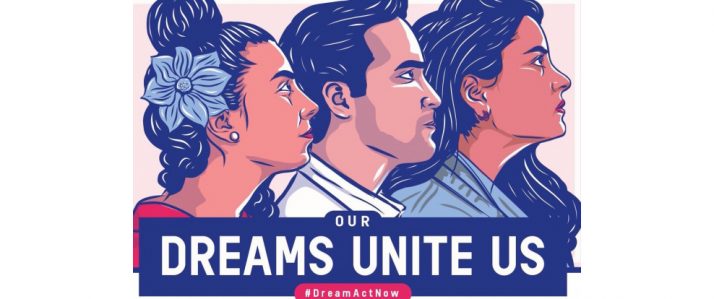By Bruce Poinsette
While Deferred Action for Childhood Arrivals (DACA) legislation will be won or lost at the federal level, Oregonians will have to vote on ballot measure 105 that would overturn Oregon’s thirty-year-old sanctuary laws which will increase racial profiling and harm undocumented people and their families, like those organized by the Oregon DACA Coalition. MRG is proud to support this new group’s work and invites you to learn more about them on their website http://oregondacacoalition.org
Prior to the 2016 Presidential Election, Leonardo Reyes had limited experience with community organizing. He had participated in a few campaigns, but nothing like the whirlwind of rallies, fundraising, lobbying, and resource development that have defined his last two years with the Oregon DACA Coalition. Then President Donald Trump was elected and Reyes’ fears for his immigration status became very real. “Am I going to lose my job? Am I not going be able to drive?” He says, “All these things that were very real that affected my way of life very directly were suddenly at the forefront of my mind.”
The next night, Reyes gathered with his sister and some friends to discuss their anxieties and provide each other with encouragement. Their fear transformed into urgency and they began organizing what would become the Oregon DACA Coalition. Comprised of all volunteers, the Salem-based organization defends immigrant families and advocates in particular for participants in the Deferred Action for Childhood Arrivals (DACA) program, which offers temporary permits to people who entered the United States without visas as minors to prevent deportation.
Participants in the coalition include DACA recipients, documented and undocumented immigrants, and allies. Their work centers around raising awareness and creating resources. Initially, they began by testifying at school board meetings in Salem, urging staff to prevent ICE from harassing undocumented children and their parents. This evolved into hosting community forums featuring first-person stories from immigrants and then a letter writing campaign to congress people. With the success of the awareness efforts, the coalition was able to raise money for scholarships to help people renew their DACA work permits.
In addition to organizing community forums and providing scholarships, the coalition also built relationships with other organizations and organized rallies in Oregon, as well as fundraised to send people to demonstrate in Washington, D.C. for the passage of a “Clean” Dream Act, or the continuation of DACA without harsh immigration measures proposed by the Trump Administration. While this effort ultimately was unsuccessful, the coalition believes they achieved a smaller victory in raising public consciousness.
“If anything, there has been a shift in culture where everyone is talking about these things,” says Reyes. “Where universities are having conversations about, ‘How do we create the access to undocumented folks or anyone who is living in our community to have an education regardless of status?’ Those conversations are happening because there has been constant visibility by actions that have been taken locally and throughout the US as a whole.”
This increased awareness even includes members of the undocumented community. Prior to joining the coalition, Jose Gil-Portillo says he hadn’t really spent much time with other Hispanic folks. However, his family’s fears for his immigration status led him to the coalition where, among other things, he was able to build a sense of community. “It helped me be more proud of who I am as opposed to being stuck in the dilemma of, I’m too brown for the Americans but I’m too American for Hispanic people,” says Gil-Portillo. “I’ve learned how to be a better ally to those in different communities. I’ve also learned that people are going to support me so I’m definitely not alone in this cause.”
Whether it’s for raising awareness, creating resources, or building community, funding support from organizations like the MRG Foundation is crucial to the coalition’s work. This support specifically allows the coalition to create and maintain meeting spaces, buy posters and signs for rallies, fly people to D.C. to lobby Congress, and cover application fees for work permit scholarship renewals, which cost $495 each.
Going forward, the coalition hopes to open DACA renewal clinics. This is part of their larger goal to create as many tools and resources as necessary to give undocumented people and their families a sense of security. “Access to a work permit provides a sense of relief for individuals and for families,” says Reyes. “It’s invaluable. It allows people to retain jobs, put food on the table. For some, it means the ability to stay in school. It gives you peace of mind, even if for only two years.”





